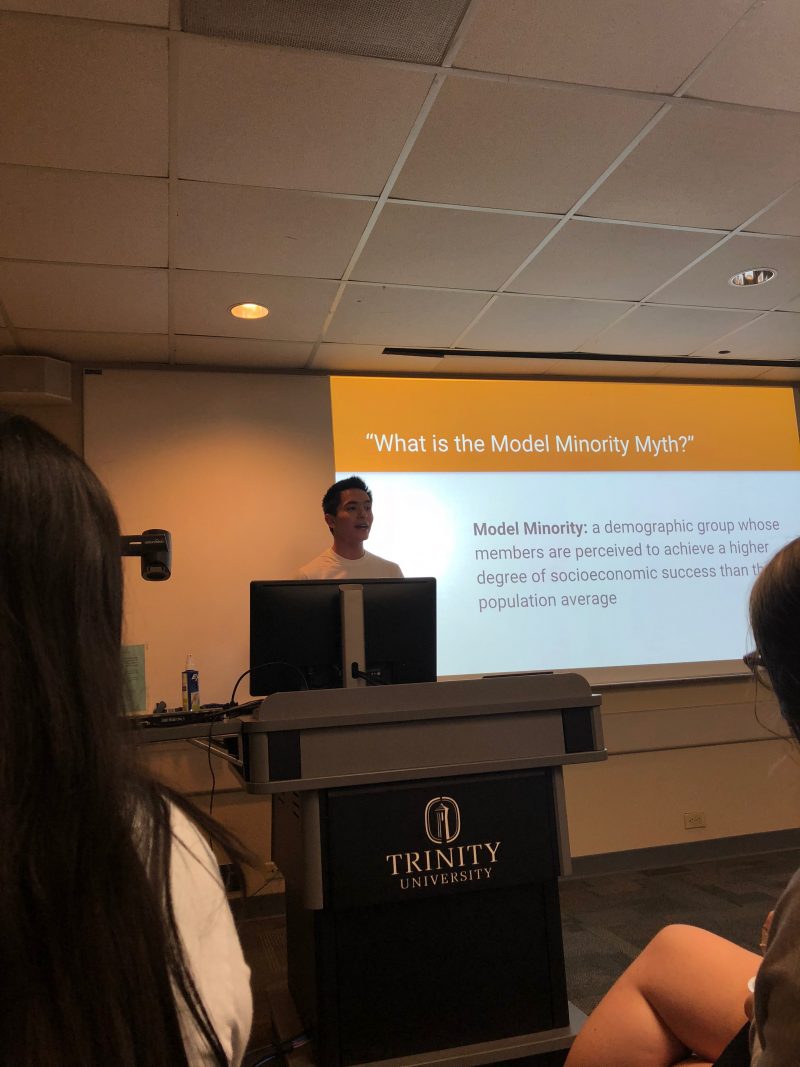Trinity Diversity Connection (TDC), a group that aims to promote diversity on campus, recently held a discussion on the “Model Minority Myth.” Junior Alex Motter, TDC’s public relations coordinator, led the diversity dialogue. Motter — who is Vietnamese-American — lobbied for this particular dialogue when he became part of the board this year. The dialogue was slated for last spring but was cancelled. Motter was not on the executive board at that time and did not know why it was cancelled.
“We needed to revive this dialogue. We needed to make it happen. I think that it would be really easy for the dialogue to just be talking about the Asian-American experience, but I think that because of how much it relates to people of color and the idea of what it means to be a minority in America, it’s a really good topic for a dialogue,” Motter said.
Motter defined the model minority myth as the perceived gold standard of Asians and Pacific Islanders as minorities, particularly in academics or socioeconomic status. According to Motter, the myth sets up unrealistic standards of success while villainizing the use of essential resources, such as welfare and food stamps.
Throughout the dialogue, people discussed how this creates division between the perceived “better” minorities, namely Asian-Americans and Pacific Islanders, and the perceived “lesser” minorities, such as Latin-Americans or African-Americans. The division serves only to pit minorities against each other and further the white supremacy narrative and anti-immigrant rhetoric prevalent in America today.
After the model minority myth had been defined, the group gathered in a circle for a discussion about how the myth had affected them personally and ways to correct issues caused by the myth. The group discussed issues such as the stigma of food stamps and poverty, as well as the harmful effects of stereotypes. The group discussed issues such as the stigma of food stamps and poverty, as well as the harmful effects of stereotypes.
Junior Natasha Sahu commented on her experience with typical Asian stereotypes as an Indian-American.
“Stereotyping Asian people, that they are smart and can do math, it leads them down that path,” Sahu said. “It doesn’t encourage them to pursue other fields.”
Others also agreed with this comment, including junior Kezia Nyarko, who is president of TDC.
“We should be supporting people who break out of these stereotypes,” Nyarko said.
The dialogue included discussion of the stigma of poverty and of the need for government assistance, such as through food stamps, particularly among African-Americans.
Instead of being seen as a mode for survival and betterment that is used by all races in America, food stamps have become stigmatized.
Some discussants determined one of the reasons that many view food stamps as a result of laziness rather than necessity was colorism.
“Colorism is discrimination through shades of different races and within races. There is a valid perception — stemming from the impact of colonialism and white supremacy — that the whiter you are, the more successful you will be,” Nyarko said. When darker people use food stamps, they become an example of lower socioeconomic status that reinforces colorism in American society.
The main goal of both this diversity dialogue and TDC is to promote discussion and awareness about diversity in our community.
“We all have our own experiences, and it’s valuable to spend the time learning from others’ experiences, and so I think no matter what your background is, you can always learn something about yourself and about other people by participating in conversations about diversity,” Motter said.
He also mentioned that small steps are important when it comes to accepting diversity and combating racism.
“Everything is small steps. We’re never going to be able to sit here during a dialogue and resolve racism,” Motter said. “But if we’re able to acknowledge how these issues affect us and learn more about how they work, it really helps us be better U.S. citizens or just better humans to each other.”
Motter hopes this discussion brings more Trinity students to TDC events.
“TDC dialogues are for everyone,” Motter said. “You shouldn’t feel uncomfortable to be involved with TDC events, you should feel really welcome and excited about coming to them because the focus is on conversation and learning as a group. [That’s] because none of us really have the answer or know how to solve it.”
Motter also emphasized that TDC dialogues offer the opportunity for everyone on campus, not just students in minority groups, to experience diversity.
“When you come from a position of the majority and you’re able to really listen to those messages [from minorities] and share them to other people, I’ve found that people are more perceptive,” Motter said.
If you are interested in getting involved with TDC, email Victoria Abila at [email protected] to be added to the mailing list or attend the next upcoming diversity dialogue on Oct. 9, “What You Need to Know About Immigration/Detention Centers” in the Waxahachie Room in Coates Student Center.







